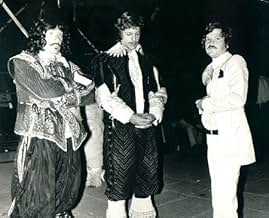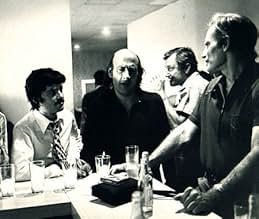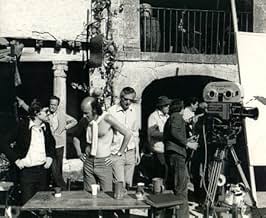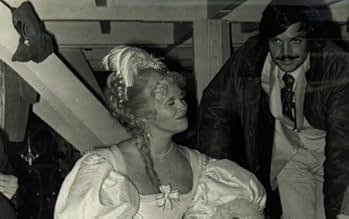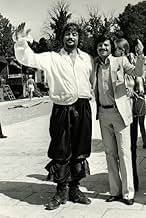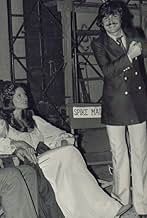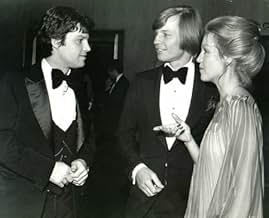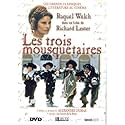IMDb-BEWERTUNG
7,1/10
21.243
IHRE BEWERTUNG
Ein junger Schwertkämpfer kommt nach Paris und trifft mit drei Musketierfreunden auf Schurken, Romantik, Abenteuer und Intrigen.Ein junger Schwertkämpfer kommt nach Paris und trifft mit drei Musketierfreunden auf Schurken, Romantik, Abenteuer und Intrigen.Ein junger Schwertkämpfer kommt nach Paris und trifft mit drei Musketierfreunden auf Schurken, Romantik, Abenteuer und Intrigen.
- Regie
- Drehbuch
- Hauptbesetzung
- Nominiert für 5 BAFTA Awards
- 4 Gewinne & 7 Nominierungen insgesamt
Jean-Pierre Cassel
- King Louis XIII
- (as Jean Pierre Cassel)
Empfohlene Bewertungen
I must admit that I was a fan of the Disney-fied version of "The Three Musketeers" in my misspent youth. The first time I saw it, I was a wide-eyed 12-year-old who thought that Kiefer Sutherland's Athos was IT as far as the character was concerned - that is, until I stumbled across this version of the much-done movie on cable last year. It was then that I watched Oliver Reed breathe a whole new life into the character of Athos with the help of a magnificent supporting cast. I have to say, I never fell off the couch laughing at the Disney version the way I did during the scene at the inn where Porthos and Aramis are attempting to pull Athos out of the well. Moreover, I never felt as though I understood the characters very well until I watched Lester's interpretation and compared it with the text of Dumas. He could not have chosen a finer cast of actors for his movie - Reed is superb as the quiet, thoughtful leader, Finlay is outlandish as Porthos, Chamberlain brings a flair to Aramis, and York seems completely immersed in D'Artangan. Yet great casting aside, the movie would be nothing if Lester had not incorporated the reality of life at court during the Musketeers' time period - the laziness and sheer excess (dogs as chess pieces on the palace lawn, wine fountains, and palace games). The fight scenes are also to be commended. They are not the overly-choreographed dances of Disney's "The Three Musketeers," but rather have a harsh reality to them. (Reed's fighting style is particularly all-out - he uses his entire body as a weapon.) In short, this movie has completely replaced the Disney version for me - as has its "sequel," "The Four Musketeers" (a must-see if you want to get the whole story and watch Porthos find "a new way to disarm himself").
Richard Lester did what no one before or since has been able to do: tell Dumas' story as magnificently as it deserves to be told. This tale gets told again and again in Hollywood, but leave it to a European to do it right. The cinematography, sets, and costumes are all fantastic, but they aren't all clean and impossibly perfect like the 1948 Gene Kelly or 1993 Kiefer Sutherland versions. Lester infuses this familiar story with an energy and tone that made his work with the Beatles successful. Yes, "The Three Musketeers" is an intriguing adventure, but the humor in their friendship, that's what draws me in again and again. And what an amazing cast he had to work with: all the Musketeers are perfect, especially big Oliver Reed, who can be silly, witty, and scary all in the same scene. The supporting cast is full of great actors, including Charlton Heston (having fun at being evil here), Christopher Lee (gets to mix deadpan humor in with his menace), Raquel Welch (cast as beautiful but clumsy, really enabling her to be a character and not just a live mannequin), Spike Milligan (doing what he does best), and most wonderfully Faye Dunaway (seductively evil: my favorite kind!). And, of course, holding it all together as D'Artagnan is Michael York, who never found a greater role.
Besides handling the shifts in tone well, Richard Lester also had the great rare luxury of breaking Dumas' large novel into two seperate movies which he filmed simultaneously. This really allows for greater character development and a truly epic scale. All of the other film versions try to cram all of that plot into 120 minutes. Not only is it impossible (in the 1993 version they simply change it completely using only the basic idea of Dumas' book), but it makes this huge complicated story with many threads seem contrived and ridiculous (the 1948 version has such dramatic and sudden shifts of tone - from wacky comedy, to romance, to heavy drama - that it can confuse and lose the audience).
This is great moviemaking.
Besides handling the shifts in tone well, Richard Lester also had the great rare luxury of breaking Dumas' large novel into two seperate movies which he filmed simultaneously. This really allows for greater character development and a truly epic scale. All of the other film versions try to cram all of that plot into 120 minutes. Not only is it impossible (in the 1993 version they simply change it completely using only the basic idea of Dumas' book), but it makes this huge complicated story with many threads seem contrived and ridiculous (the 1948 version has such dramatic and sudden shifts of tone - from wacky comedy, to romance, to heavy drama - that it can confuse and lose the audience).
This is great moviemaking.
10mvario
This film, and its sequel (filmed concurrently) is by far the best movie version of the Dumas novel ever produced. The cast is excellent. The sets and costumes are marvelous. The swordplay (and there is much) is possible some of the most realistic ever filmed. And it's the only Musketeer movie I am aware of in which the Musketeers actually use muskets. Authenticity seems to have been very important to the producers, as well as staying true to the novel.
Sadly a film like this wouldn't be made these days. First off the fighting would be "punched-up" with a lot of wire work. And of course Hollywood would change the story to eliminate much of the "sleeping around" characters do (today's movie heroes in this type of movie aren't usually sexually active). They would also provide some creative story editing so that a certain character who dies in the novel would survive so as to supply the requisite happy ending. Fortunately for us this version does not suffer that kind of revisionism.
If you're a fan of Dumas or just looking for a fun film with lots of realistic sword fighting then you won't want to miss this.
Sadly a film like this wouldn't be made these days. First off the fighting would be "punched-up" with a lot of wire work. And of course Hollywood would change the story to eliminate much of the "sleeping around" characters do (today's movie heroes in this type of movie aren't usually sexually active). They would also provide some creative story editing so that a certain character who dies in the novel would survive so as to supply the requisite happy ending. Fortunately for us this version does not suffer that kind of revisionism.
If you're a fan of Dumas or just looking for a fun film with lots of realistic sword fighting then you won't want to miss this.
Alexandre Dumas's classic The Three Musketeers seems to never lose its appeal, it gets another cinema version every generation. In the seventies Richard Lester shot such a long film that producers Alexander and Ilya Salkind decided to release it in two parts. This film only takes us to the point of the affair of the diamond studs.
Michael York is one truly bumptious Gascon in his interpretation of D'Artagnan. Apparently it's a French mantra that people from Gascony are braggarts and quick to fight. I don't know how well that point is known outside the French speaking world, but it's in the strength of Dumas's tale that we Americans even those who haven't studied The Three Musketeers in high school of college English can appreciate that fact. Because of that fact he manages to make all kinds of enemies, the wrong ones and the right ones.
Fortunately the right ones, Athos, Porthos, and Aramis, Oliver Reed, Frank Finlay, and Richard Chamberlain all recognize York's worth and he becomes a companion of The Three Musketeers. The King's own guard, fighting against the encroaching power of France's prime minister Cardinal Richelieu.
Charlton Heston adds to his collection of real historical characters portrayed on film with his interpretation of Richelieu. He was hardly the villain in real life that he is here. As he said on his deathbed that he had no enemies, but the enemies of the state. Richelieu was in fact a great French patriot though as a Cardinal was not terribly pious or scrupulous.
Richelieu was also not a tall man and the six foot two inch Charlton Heston had to stoop over a bit when playing him. Note that carefully when you watch Heston, especially in his scenes with Christopher Lee as Rochefort. Lee does not lack in the height department either.
Three women have substantial roles in The Three Musketeers. Raquel Welch makes a sexy Constance, not quite the innocent that June Allyson played her as in the MGM version with Gene Kelly. Geraldine Chaplin is serene and beautiful, but tragically unloved except by Great Britain's prime minister the Duke of Buckingham {Simon Ward}, France's mortal enemy. Milady DeWinter played by Faye Dunaway is as deadly and beautiful as Lana Turner was in the Gene Kelly film.
Personally I've never thought that Hollywood ever got The Three Musketeers quite right. It will never happen I'm sure, but I'd love to see the operetta that Rudolf Friml wrote the music for, made into a Three Musketeers film. Still this one isn't too bad with an accent more on bawdy comedy than anything else. The followup Four Musketeers takes a more serious turn.
Michael York is one truly bumptious Gascon in his interpretation of D'Artagnan. Apparently it's a French mantra that people from Gascony are braggarts and quick to fight. I don't know how well that point is known outside the French speaking world, but it's in the strength of Dumas's tale that we Americans even those who haven't studied The Three Musketeers in high school of college English can appreciate that fact. Because of that fact he manages to make all kinds of enemies, the wrong ones and the right ones.
Fortunately the right ones, Athos, Porthos, and Aramis, Oliver Reed, Frank Finlay, and Richard Chamberlain all recognize York's worth and he becomes a companion of The Three Musketeers. The King's own guard, fighting against the encroaching power of France's prime minister Cardinal Richelieu.
Charlton Heston adds to his collection of real historical characters portrayed on film with his interpretation of Richelieu. He was hardly the villain in real life that he is here. As he said on his deathbed that he had no enemies, but the enemies of the state. Richelieu was in fact a great French patriot though as a Cardinal was not terribly pious or scrupulous.
Richelieu was also not a tall man and the six foot two inch Charlton Heston had to stoop over a bit when playing him. Note that carefully when you watch Heston, especially in his scenes with Christopher Lee as Rochefort. Lee does not lack in the height department either.
Three women have substantial roles in The Three Musketeers. Raquel Welch makes a sexy Constance, not quite the innocent that June Allyson played her as in the MGM version with Gene Kelly. Geraldine Chaplin is serene and beautiful, but tragically unloved except by Great Britain's prime minister the Duke of Buckingham {Simon Ward}, France's mortal enemy. Milady DeWinter played by Faye Dunaway is as deadly and beautiful as Lana Turner was in the Gene Kelly film.
Personally I've never thought that Hollywood ever got The Three Musketeers quite right. It will never happen I'm sure, but I'd love to see the operetta that Rudolf Friml wrote the music for, made into a Three Musketeers film. Still this one isn't too bad with an accent more on bawdy comedy than anything else. The followup Four Musketeers takes a more serious turn.
THE THREE MUSKETEERS, Richard Lester's comic take of the oft-filmed Dumas adventure story, is not only terrific escapist fare with a brilliant cast, but stands as the most faithful adaptation of the Musketeer saga.
The very length of the novel, with it's many plot twists, had resulted in various truncated adaptations over the years, with MGM's 1948 all-star production the only previous attempt to film more than the first half of the book. Lester, however, backed by producers Alexander and Ilya Salkind, and Wolfdieter von Stein, and working from a unrepentantly bawdy script by legendary scribe George MacDonald Fraser, tackled the novel head-on, with extraordinary results.
The novel's hero, young master swordsman D'Artagnan (portrayed by Michael York at his most boyish), is clearly the product of an impoverished Gascon household, unable to read or write, but filled with dreams of heroism in the elite Musketeers, and "fighting frequent duels". Quickly embarrassed by the smoothly villainous Rochefort (Christopher Lee), and ridiculed by the mysterious Milady de Winter, the lad reaches Paris with a broken sword, but his idealism undimmed. With a borrowed sword, he then blunders into a series of challenges from the three title characters, emotionally scarred alcoholic Athos (Oliver Reed), comic buffoon Porthos (Frank Finlay), and dandified ladies' man/priest wannabe Aramis (Richard Chamberlain). When the Cardinal's Guard attempts to arrest the four as Athos and D'Artagnan begin their duel, the Gascon displays such extraordinary skill with a sword that he is happily welcomed into the band of rogues, who help him procure a servant (the wonderfully comic Roy Kinnear) and lodgings at the home of an old reprobate (Spike Milligan) and his beautiful, if klutzy young wife (Raquel Welch, in her finest comic role), who the boy immediately lusts after. The four friends then embark on a series of hilarious, swashbuckling escapades.
Meanwhile, intrigue runs rampant in the Court; the Queen (Geraldine Chaplin) carries on a clandestine affair with the British Prime Minister, the Duke of Buckingham (Simon Ward), under the oblivious eye of her husband, Louis XIII (Jean-Pierre Cassel), while evil Cardinal Richelieu (Charlton Heston, who is marvelous, 'against type') plots to publicly embarrass her, and reveal her involvement, thus provoking a war with England, and the elimination of France's Protestant faction. The object of betrayal is a multi-jeweled necklace, a gift from Louis, given by the Queen to Buckingham, with two jewels stolen during a tryst by the Cardinal's agent, Milady de Winter. The task of recovering of the necklace, and replacing the missing jewels, is given to D'Artagnan and his Musketeer allies, who 'sacrifice' themselves to help the Gascon reach England.
Climaxing in a wild free-for-all at a Royal Ball, love triumphs, Richelieu is temporarily thwarted, Milady swears revenge against D'Artagnan, and he becomes a full-fledged Musketeer, joining his love and three recovered friends to celebrate.
This constitutes only the FIRST half of the novel and movie, and the filmmakers decided to end the picture at this point, releasing a sequel, THE FOUR MUSKETEERS, a year later, which would cover the darker remainder of the story. While it was a wise decision, no one had informed the cast that they were, in fact, making two movies, and not one, at the time of filming, and the stars quickly filed suit against the Salkinds. After a brief but highly publicized court case, the cast were compensated, and the second, equally enjoyable MUSKETEER film was released.
THE THREE MUSKETEERS (and it's sequel, THE FOUR MUSKETEERS) were triumphs for Lester, the Salkinds, and the matchless ensemble of actors. The films have achieved legendary status, over the years, and taken together, stand, today, as one of the finest comic adventures ever made.
If your experience of the tale is only the more recent Disney version, do yourself a favor, and catch the Lester films. You won't be disappointed!
The very length of the novel, with it's many plot twists, had resulted in various truncated adaptations over the years, with MGM's 1948 all-star production the only previous attempt to film more than the first half of the book. Lester, however, backed by producers Alexander and Ilya Salkind, and Wolfdieter von Stein, and working from a unrepentantly bawdy script by legendary scribe George MacDonald Fraser, tackled the novel head-on, with extraordinary results.
The novel's hero, young master swordsman D'Artagnan (portrayed by Michael York at his most boyish), is clearly the product of an impoverished Gascon household, unable to read or write, but filled with dreams of heroism in the elite Musketeers, and "fighting frequent duels". Quickly embarrassed by the smoothly villainous Rochefort (Christopher Lee), and ridiculed by the mysterious Milady de Winter, the lad reaches Paris with a broken sword, but his idealism undimmed. With a borrowed sword, he then blunders into a series of challenges from the three title characters, emotionally scarred alcoholic Athos (Oliver Reed), comic buffoon Porthos (Frank Finlay), and dandified ladies' man/priest wannabe Aramis (Richard Chamberlain). When the Cardinal's Guard attempts to arrest the four as Athos and D'Artagnan begin their duel, the Gascon displays such extraordinary skill with a sword that he is happily welcomed into the band of rogues, who help him procure a servant (the wonderfully comic Roy Kinnear) and lodgings at the home of an old reprobate (Spike Milligan) and his beautiful, if klutzy young wife (Raquel Welch, in her finest comic role), who the boy immediately lusts after. The four friends then embark on a series of hilarious, swashbuckling escapades.
Meanwhile, intrigue runs rampant in the Court; the Queen (Geraldine Chaplin) carries on a clandestine affair with the British Prime Minister, the Duke of Buckingham (Simon Ward), under the oblivious eye of her husband, Louis XIII (Jean-Pierre Cassel), while evil Cardinal Richelieu (Charlton Heston, who is marvelous, 'against type') plots to publicly embarrass her, and reveal her involvement, thus provoking a war with England, and the elimination of France's Protestant faction. The object of betrayal is a multi-jeweled necklace, a gift from Louis, given by the Queen to Buckingham, with two jewels stolen during a tryst by the Cardinal's agent, Milady de Winter. The task of recovering of the necklace, and replacing the missing jewels, is given to D'Artagnan and his Musketeer allies, who 'sacrifice' themselves to help the Gascon reach England.
Climaxing in a wild free-for-all at a Royal Ball, love triumphs, Richelieu is temporarily thwarted, Milady swears revenge against D'Artagnan, and he becomes a full-fledged Musketeer, joining his love and three recovered friends to celebrate.
This constitutes only the FIRST half of the novel and movie, and the filmmakers decided to end the picture at this point, releasing a sequel, THE FOUR MUSKETEERS, a year later, which would cover the darker remainder of the story. While it was a wise decision, no one had informed the cast that they were, in fact, making two movies, and not one, at the time of filming, and the stars quickly filed suit against the Salkinds. After a brief but highly publicized court case, the cast were compensated, and the second, equally enjoyable MUSKETEER film was released.
THE THREE MUSKETEERS (and it's sequel, THE FOUR MUSKETEERS) were triumphs for Lester, the Salkinds, and the matchless ensemble of actors. The films have achieved legendary status, over the years, and taken together, stand, today, as one of the finest comic adventures ever made.
If your experience of the tale is only the more recent Disney version, do yourself a favor, and catch the Lester films. You won't be disappointed!
Wusstest du schon
- WissenswertesOliver Reed was severely injured and almost died when he was stabbed in the throat during the windmill duel scene.
- PatzerRichelieu refers to Buckingham as the Prime Minister of England. However, the title was not adopted until the early 1700s, and even then was an unofficial name for the First Lord of the Treasury. It was not until 1937 that it was enshrined in law as the title of the Head of Government. Although Buckingham was undoubtedly one of the most powerful members of the English Court, he had no formal position as such, as there was no equivalent of a Prime Minister: the King himself was regarded as the Head of Government as well as Head of State.
- Zitate
Cardinal Richelieu: Who is the man that accuses you?
Bonacieux: [Rochefort enters and Bonacieux points at him] That! That is the man!
Count Rochefort: Take him away.
Bonacieux: That is *not* the man!
- VerbindungenEdited into Die vier Musketiere (1974)
Top-Auswahl
Melde dich zum Bewerten an und greife auf die Watchlist für personalisierte Empfehlungen zu.
Details
- Erscheinungsdatum
- Herkunftsländer
- Offizieller Standort
- Sprache
- Auch bekannt als
- The Three Musketeers
- Drehorte
- Summer Palace, Aranjuez, Madrid, Spanien(The Louvre)
- Produktionsfirmen
- Weitere beteiligte Unternehmen bei IMDbPro anzeigen
Box Office
- Budget
- 4.500.000 $ (geschätzt)
Zu dieser Seite beitragen
Bearbeitung vorschlagen oder fehlenden Inhalt hinzufügen

Oberste Lücke
By what name was Die drei Musketiere (1973) officially released in India in Hindi?
Antwort

